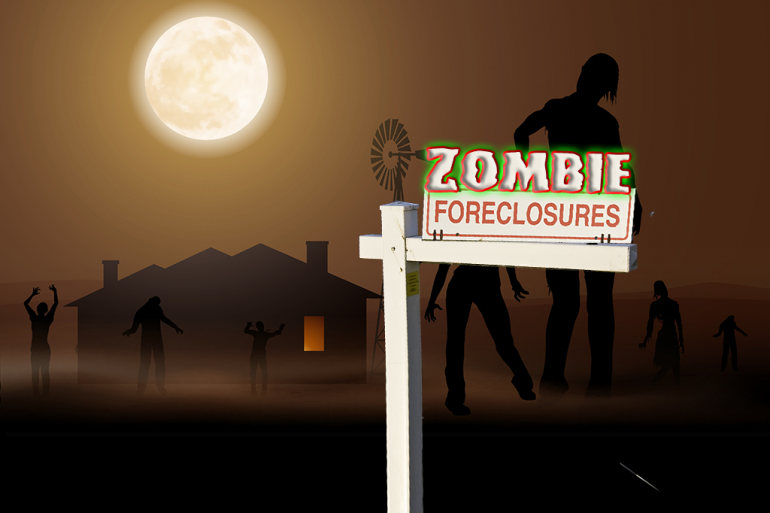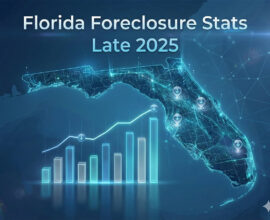How to Make Money With Zombie Foreclosures
How to Make Money With Zombie Foreclosures
There seems to be about a thousand ways to make money in real estate, although few sound as spooky as zombie foreclosures. While it could make for an interesting workday, we promise that no zombies are actually involved.
So, what is a zombie foreclosure, and how can you make money with zombie foreclosures?
Let’s Start With the Basics
A zombie foreclosure is a foreclosure that is never completed, leaving the former homeowners who moved out during the foreclosure (thinking they were no longer liable for the house) unknowingly responsible and liable for the property. Once the occupants have moved out and the lender has stopped pursuing the property through foreclosure, the property sits in a state of limbo as it falls into disrepair.
When these owners flee from their homes thinking they are no longer responsible for maintaining the home and paying taxes, utilities, mortgage payments, and HOA fees, the homes quickly fall apart and become an eyesore. Not only are they unpleasant to look at, but they have a powerful impact on property values and negatively affect every house around them.
Why do zombie foreclosures occur? Sometimes banks determine that they will lose more money by foreclosing on the property than if they did not. Perhaps administrative error pushes the foreclosure of the property onto the backburner, where it is lost among countless files and never resumed again.
Although it seems like there is a lot of negativity surrounding zombie foreclosures, the unique situation that zombie foreclosures are in allows investors to get creative and make money in more ways than the typical on-market buy and hold deal. Examples include zombie flipping, zombie house hacking, and zombie BRRRRs.
Zombie Flipping?
One of the primary benefits afforded to real estate investors looking to make money with zombie foreclosures is the low cost barrier to entry. Typically, zombie foreclosures can be picked up for a fraction of the market price of the property — even lower than the price a wholesaler would expect to pay for a similar property.
By focusing on this smaller niche within flip properties and reducing the up-front costs of acquiring the property, you increase the potential margin on each deal in addition to the volume of deals that you can theoretically afford to do at any time.
The number of investors targeting zombie foreclosures is relatively small due to the stigma surrounding them. It’s difficult to track down the true owner to explain the situation of their property ownership and negotiate a deal with them. The upside is that it’s not uncommon for owners to sell their properties for pennies on the dollar in exchange for relieving them of their unpaid tax obligations and any other liens that have been placed on the property.
Although less common, highly motivated sellers may be willing to deed the property to someone solely in exchange for helping them out of the situation and assuming their liabilities. This is incredibly rare, but there are investors with limited capital who make a living by focusing specifically on acquiring the most distressed properties from the most cash-stressed sellers they can find.
Not only can you handle more deals at any given point in time with the lower acquisition costs of zombie foreclosures, but you have a much higher upside given the miniscule up-front inputs in comparison to an on-market deal of a similar property.
How to Find Zombie Foreclosures
One of the best ways to find zombie foreclosures is to get in good with the local tax authority, lenders, property managers, and real estate agents. Having people on the “inside” who can send deals your way before they have a chance to sit for too long is a unique advantage.
By reaching out to all of your local lenders that hold loans in-house, sometimes you can get a list of foreclosed properties that the bank has decided to pass on and have since potentially become zombie foreclosures. The zombie foreclosure scenario is not the most common one, so most of the time the lender will know exactly which one or two properties fall into this unique category.
Looking through the local county appraisal district website for addresses that have delinquent taxes for previous years is also a great first step. Once you have found properties with tax delinquency (usually two or more years is the safest bet for thinning out people who have simply forgotten to pay taxes), do a quick Google search of the property’s address along with the listed owner’s name to see if there is any record of the foreclosure filing.
Most cities post foreclosure notices online in addition to the paper form on the courthouse doors. There will be a record of it online for you to search up and find years later when it never ends up getting sold on the courthouse steps.
The name on the property with the years of delinquent taxes will usually show up when you search the property address along with keywords like “foreclosure,” “foreclose,” “notice of default,” etc. and will give you an idea of how much needs to be paid to the city upon acquisition of the property.
A real estate agent who is well-versed in zombie foreclosures in your target market is an invaluable asset. Finding this agent is not easy, but after interviewing numerous agents in your target market who specialize in investment properties, it is possible to meet one who is driven enough to hunt down these properties on your behalf.
Marketing to Zombie Foreclosures
How can you find zombie foreclosures without any connections in the area, or if you are out of state? Maybe you cannot drive neighborhoods in your target market and need a way to cast a broad net across an area or market to stir up as many prospective leads as possible.
Utilizing online advertising via Google and Facebook is an excellent way to get your message directly in front of your target homeowner who (often unknowingly) owns a zombie foreclosure. Planting the seed that these homeowners may still be liable for their foreclosed home will drive online traffic into your sales funnel — they will be curious to find out if they still own their home and are delinquent on taxes or responsible for maintaining it.
Creating a simple landing page signup form where visitors can input their contact information, address, and if they think their home was foreclosed on gives you a simple way to fill up your lead funnel with prospects.
Offering the free service of digging into property records on homeowners’ behalf will motivate them to sign up and trade you their address and contact information in exchange.
Spotting a Zombie Foreclosure
If you have heard the term “driving for dollars” before when talking about hunting down wholesale or fix and flip deals, then you are on the right track for finding zombie foreclosures.
These properties are often at the bottom of the barrel for the neighborhood. They show the most signs of wear, tear, and neglect because nobody has been living in them (potentially for years). Here’s what to look for:
- Newspapers, telephone books, and mail stacked up on the porch
- A green slip from the postmaster stuck on the mailbox to indicate a vacant property to mail carriers (this is regional and may or may not be done in your area)
- Overgrown yards or broken windows
Since these properties are in significantly worse condition than the surrounding houses, they usually stick out like a sore thumb. The hard part? You may drive neighborhoods for days or weeks before finding a dilapidated property that is a zombie foreclosure.
This goes back to our point about using online resources such as the local county assessor’s office or tax authority as well as county foreclosure notifications. Combining these online factors with digital marketing is an excellent way to complement your in-person actions.
How to Close the Deal
Once you have found a zombie foreclosure and tracked down the actual owner, how do you come to an agreement with them and make a deal happen? What if this person has no idea they still own the property?
If possible, use a licensed real estate professional to assemble and present all necessary state-promulgated contract forms in order to keep everything as tidy as possible and maintain a clean paper trail. If that’s not possible, do your research prior to offering and pull together an official offer on a contract with your initials and signature before submitting it to the owners.
Zombie foreclosures can be a touchy subject for owners, especially if they were unaware of their continued ownership of the property. Approach the topic delicately and from a place of service. Come with solutions to their problem and be genuine in your pursuit of helping them find the best solution.
If purchasing the property from them yourself is not best for everybody, do not push it on homeowners or attempt to take advantage of them.
Perhaps they were simply unaware of their ownership and there is an opportunity for you to help them get back in their home — they will remember how you helped. If they come across a deal in the future, know someone who needs to get out of their home, or get in a pickle again and end up needing to sell, then you will be the first person that comes to mind. They will likely be more than willing to make a deal that works best for you.
The most successful negotiators are not trying to win negotiations, but rather provide the optimal solution to a problem that the seller (or other party) has. Keep this in mind when approaching homeowners of zombie foreclosures and focus on an outcome that is beneficial for all involved.
Savvy Investors Don’t Discount Zombie Foreclosures
Zombie foreclosures can be tricky to find and handle, which is why many real estate investors never pursue them. What that means for you, though, is opportunity. By learning more about these foreclosure properties and how you can use them to your advantage, you may find diamonds where others only see junk.








